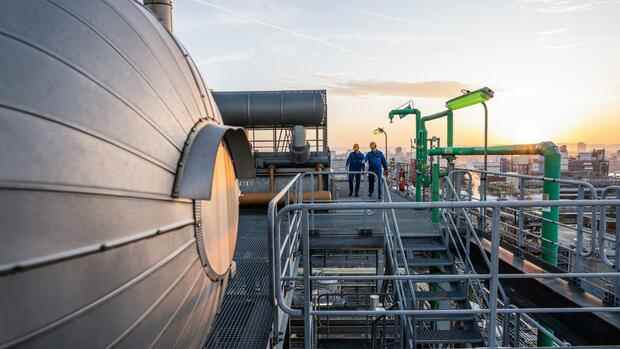Large quantities of natural gas are required at the chemical company’s home site.
(Photo: obs)
Dusseldorf The war in Ukraine led to a sudden change of mood in the German chemical industry. Just a few weeks ago, the industry was expecting further growth this year. However, with the outbreak of war in Ukraine, more than half of the companies expect production and sales to fall.
This was the result of a current survey by the industry association VCI among its member companies. After that, the situation changed dramatically for energy- and raw material-intensive chemistry due to the Ukraine war. Oil and natural gas prices have risen sharply. The financial leeway of companies is dwindling more and more.
70 percent of the companies are already reporting serious problems for their business due to the high energy prices – above all due to the expensive natural gas, which is the most important energy supplier for the operation of the chemical plants. 85 percent state that they are either unable or only partially able to pass on rising production and procurement costs to customers.
The VCI has therefore withdrawn its previous assessment for the full year 2022, which envisaged an increase in sales of five percent. The Chemical Association is currently unable to update: “Any forecast would be highly speculative,” said VCI Managing Director Wolfgang Große Entrup.
Top jobs of the day
Find the best jobs now and
be notified by email.
A possible embargo on Russian raw material supplies would affect the industry in different ways. Oil is the most important raw material for chemistry. The chemical industry could probably still put up with the loss of oil from Russia – the VCI does not assume that this would lead to cutbacks or even cessation of production in the chemical-pharmaceutical industry.
A good third of oil imports in Germany come from Russian sources. This could be replaced as oil is basically available on the world market from many regions and countries. In addition, the supply by ship or pipeline for the refineries is secured. However, oil prices are likely to rise significantly – and with them end consumer prices.
If chemistry suffers, a number of other sectors suffer
On the other hand, stopping the import of Russian natural gas would have massive consequences for the chemical-pharmaceutical industry. “Deep cuts in the production level of the industry would not only be expected in large energy-intensive companies, but also inevitable in medium-sized companies and probably across all sectors,” emphasized Große Entrup.
The effects would not be limited to chemistry. The sector is a supplier of raw materials for almost all processing industries. A failure would affect the agriculture, food, automotive, cosmetics, construction, packaging, pharmaceuticals or electronics sectors via the value chains.
In the event of an embargo on Russian natural gas, the VCI expects a “severe and multi-year recession with massive job losses”. Unlike in the financial and corona crisis, this would not be a state of shock, but the economic performance of German industry would be at stake.
>> Read about this: No gas embargo: the chemical industry supports Habeck’s course
The industry is already demanding a reaction from politicians. From the point of view of the VCI, all timely solutions that support the security of supply and affordability of energy should have absolute priority – such as the timely abolition of the EEG surcharge, a reduction in energy tax to the EU minimum or a temporary suspension of the phase-out of coal-fired power generation .
At the same time, the expansion of renewable energies and the necessary infrastructure must be pushed forward with all our might – even against resistance. In order to position the country and the industry better, the acceleration of planning and approval procedures must be of paramount importance. For the VCI, the project of the EU chemicals strategy with the extensive new regulation for chemicals belongs to the category “postponement”.
The economic ties between the German chemical and pharmaceutical industry and the warring factions is manageable, but not insignificant: Russia and the Ukraine together account for almost three percent of German chemical and pharmaceutical exports. That was last good 6.8 billion euros.
More: Fertilizer manufacturers are curbing production: there is a risk of crop losses worldwide
